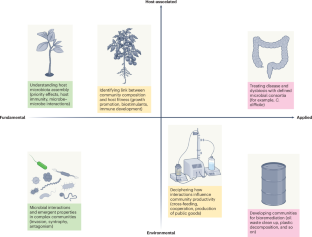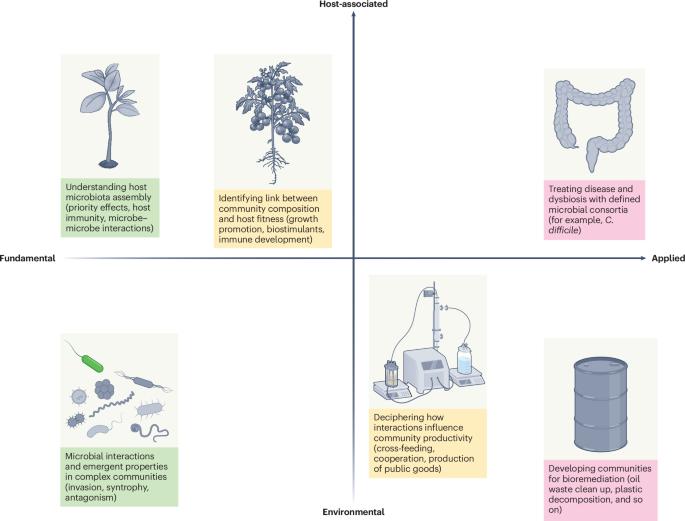合成微生物群落的跨系统入门指南
IF 20.5
1区 生物学
Q1 MICROBIOLOGY
引用次数: 0
摘要
合成群落(SynComs)的设计和使用是最有前途的策略之一,可用于揭示微生物群落内部以及这些群落与其宿主之间复杂的相互作用。与自然群落相比,这些简化的联合体为在可控尺度上研究生态相互作用提供了机会,同时也有利于可重复性和促进跨学科科学的发展。然而,要有效实施 SynCom 方法,需要在开发和应用这些模型系统时考虑几个重要因素。在临床、农业或环境环境中设计和部署综合观测系统时,还需要考虑新出现的伦理问题。在此,我们将概述目前在不同系统中开发、实施和评估 SynComs 的最佳实践,包括重点关注 SynCom 研究的重要伦理考虑因素。本文章由计算机程序翻译,如有差异,请以英文原文为准。


A cross-systems primer for synthetic microbial communities
The design and use of synthetic communities, or SynComs, is one of the most promising strategies for disentangling the complex interactions within microbial communities, and between these communities and their hosts. Compared to natural communities, these simplified consortia provide the opportunity to study ecological interactions at tractable scales, as well as facilitating reproducibility and fostering interdisciplinary science. However, the effective implementation of the SynCom approach requires several important considerations regarding the development and application of these model systems. There are also emerging ethical considerations when both designing and deploying SynComs in clinical, agricultural or environmental settings. Here we outline current best practices in developing, implementing and evaluating SynComs across different systems, including a focus on important ethical considerations for SynCom research. Here the authors outline best practices for the development, implementation and evaluation of synthetic microbial communities (or SynComs) across different systems.
求助全文
通过发布文献求助,成功后即可免费获取论文全文。
去求助
来源期刊

Nature Microbiology
Immunology and Microbiology-Microbiology
CiteScore
44.40
自引率
1.10%
发文量
226
期刊介绍:
Nature Microbiology aims to cover a comprehensive range of topics related to microorganisms. This includes:
Evolution: The journal is interested in exploring the evolutionary aspects of microorganisms. This may include research on their genetic diversity, adaptation, and speciation over time.
Physiology and cell biology: Nature Microbiology seeks to understand the functions and characteristics of microorganisms at the cellular and physiological levels. This may involve studying their metabolism, growth patterns, and cellular processes.
Interactions: The journal focuses on the interactions microorganisms have with each other, as well as their interactions with hosts or the environment. This encompasses investigations into microbial communities, symbiotic relationships, and microbial responses to different environments.
Societal significance: Nature Microbiology recognizes the societal impact of microorganisms and welcomes studies that explore their practical applications. This may include research on microbial diseases, biotechnology, or environmental remediation.
In summary, Nature Microbiology is interested in research related to the evolution, physiology and cell biology of microorganisms, their interactions, and their societal relevance.
 求助内容:
求助内容: 应助结果提醒方式:
应助结果提醒方式:


